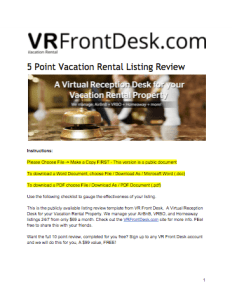It is bound to happen, sooner or later…
No host can be perfect all the time, and sometimes there are guests who have a bad experience.
It is not always your fault or within your control, but it can happen.
In this article we are going to review 8 steps to handle your negative reviews.
It is not all bad news however, as you can often turn a negative review around or even persuade somebody not to leave a negative review even though they had a bad experience.
Here is the negative review process
Preemptive Steps
90% of the time, you are going to know when a potential bad review is coming.
Sometimes its intuition, and sometimes its the angry messages the guest has been leaving your on your AirBnB message list.
If you know there is a screw up, like the cleaner didn’t come on time and the guest showed up to a dirty apartment, its time to use our preemptive checklist.
Preemptive Step 1 – Outreach and Apologize
So you know something went wrong? Then don’t wait for a bad review to hit you over the head, reach out to the guest and don’t be defensive. Apologize for the screw-up, whatever it was even if it was outside of your control. This can go a long way.
The quickest way to guarantee a bad review is to be defensive or argumentative with your guest
Preemptive Step 2 – Fix the problem
Whatever caused your guest to get upset in the first place, its time to fix it and fix it decisively if possible. This may cost you money, but this is time to spend it.
If your cleaner didn’t show up at all, call another one and bribe them to do it quickly!
If there is a leak, call a 24 hour plumber and get it fixed.
An investment here is worth it, as it shows the guest you are taking their problem seriously and that they are important to you.
Besides, you would have to fix the problem anyway. Spending a bit extra here to salvage your guest relationship will ultimately have a positive return for you here.
Preemptive Step 3 – Refund and build goodwill
A little refund often goes a long way.
I use the AirBnB resolution tool, or the VRBO partial refund, to give the guest back a little bit of money in certain cases.
This may not work every time, and it may not be appropriate everytime. But in certain cases, it is totally the right thing to do.
Back to instance when my cleaners got the dates screwed up and the guests came in to a messy place with dirty towels on the floor and sand everywhere. In that case, I refunded them 100% of the cleaning fee and got my cleaners to come back ASAP.
In another instance, the cleaner was still there when the guests showed up and the unit was not ready at check in time. In this case, I refund the cleaning fee 50%. I would then negotiate with your cleaners to not pay or get a discount too, especially if its their fault.
Guests shouldn’t have to pay for a service that wasn’t properly delivered, and by providing a small refund I got a lot of goodwill and potentially avoided a bad review.
Preemptive Step 4 – Email the day of checkout
This is a very important step and can make all the difference.
Since you know something went south during your last stay, email the guest on the day of their checkout – BEFORE they have a chance to leave a review.
You need to tell them again that you are sorry about whatever bad thing happened.
Next, you should explain the steps you are taking so that whatever bad thing happened, won’t happen again to the next guest and if appropriate, thank them for helping you improve your systems / process / etc.
Lastly, you should explain that your review score is really important to you and that even one bad review can really mess up your score and cause you to lose business.
Now if you did the first 3 steps correctly, you should have built up some good will already despite what happens.
I have found that asking them to leave an honest and fair review, but not to make it “too negative” because you did your best to correct the issue can make a big impact on what the guest will write.
I have had guests say that if I didn’t contact them in this way, they would have written a really bad review mainly to warn future guests about whatever problem they encountered. By stating that you already fixed it and it won’t happen again, you can often convince them not to leave such a negative review.
Reactive Steps
Now sometimes you will just get a bad review out of the blue. It happens.
Or the guest didn’t alert you to any problems until it was too late.
There are still a few steps you can take to lessen the impact of that bad review.
Here is what you can do!
Step 1 – Fully Investigate
Time to put on that Sherlock Holmes hat.
Figure out what went wrong and if there is anything in there that you can learn. Message the guest directly after you have read the review, and try to get more information. Just like in the preemptive section, it is in your best interest to NOT be defensive and apologize for whatever problem they experienced.
Also check your star categories, did any go down (like cleanliness or communication)? AirBnB won’t tell you directly, but sometimes you can see what happened by seeing which category changed.
Step 2 – Check the Policies
As part of AirBnB’s new review policies, once reviews are public, they can never be changed. But, sometimes the really bad reviews also happen to violate AirBnB policies themselves. Is there anything derogatory, cursing, or just plain untrue?
Also make sure its not blackmail, if they threatened to leave a bad review unless you give them a discount, you can tell AirBnB about it and they will actually review your message history and they may delete reviews that fall outside of their guidelines.
Step 3 – Respond within 15 days
Once the reviews are public, you have a limited time to respond.
You can usually pick out the hosts who really care about their properties, as they publicly respond to any and all negative or even neutral reviews.
Just like contacting the guest directly, you have to take the high road here. Don’t be defensive, and refrain from blaming the guest even if it was their fault or unreasonable expectation.
For instance, I had a guest complain that they were cold in my apartment, in Hawaii! That was a first. Worse still, in the linen closet there are a bunch of extra blankets, pillows, etc. But, it was a legitimate complaint that I had to take seriously. The last thing you would want to do is blame the guest for not finding the blankets, as that would come off as a bad host. So I just noted that I would be sure to explain to future guests where to find the extra blankets, and I put some details in the house manual to that effect. Problem solved!
Step 4 – Adjust Price if required
This is going to be a market determined step which is also different for experienced hosts with lots of reviews, and those just getting started.
If you have a ton of reviews, you can probably absorb one or two bad reviews without taking a big impact, assuming you followed all the above steps to minimize their effect.
However, if you are just getting started, you may need to take some measures to start getting bookings again.
You want to get past this negative review as quickly as possible, so dropping your price and working extra hard to make sure the next few stays are “5 stars” is a good strategy to recover. Most people probably will only read the first page of reviews anyway.
In conclusion
I hope these tips were useful additions to your hosting toolbox. Following these steps can hopefully prevent any bad reviews, and rectify the impact if you do happen to get one.
Are there any other bad review tips that have worked for you? Leave a comment below and tell us about them!




Dear Front desk:
I have been renting some places since over 3 years and only receive 5 star reviews. I had a group of 6 leaving last weekend and one person in the group I never communicated with wrote a super negative report and untrue points. The lady who booked I had contact with during the stay and before was positive and wrote she wanted to come back. I have the impression that the group fell out of each other or there were personal problems within the group. But the report was devastating. What can I do about that?
Best regards Hayte Haakma Review #16879374